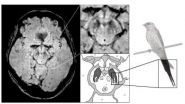(Press-News.org) You know what you're going to say before you say it, right? Not necessarily, research suggests. A study from researchers at Lund University in Sweden shows that auditory feedback plays an important role in helping us determine what we're saying as we speak. The study is published in Psychological Science, a journal of the Association for Psychological Science.
"Our results indicate that speakers listen to their own voices to help specify the meaning of what they are saying," says researcher Andreas Lind of Lund University, lead author of the study.
Theories about how we produce speech often assume that we start with a clear, preverbal idea of what to say that goes through different levels of encoding to finally become an utterance. But the findings from this study support an alternative model in which speech is more than just a dutiful translation of this preverbal message:
"These findings suggest that the meaning of an utterance is not entirely internal to the speaker, but that it is also determined by the feedback we receive from our utterances, and from the inferences we draw from the wider conversational context," Lind explains.
For the study, Lind and colleagues recruited Swedish participants to complete a classic Stroop test, which provided a controlled linguistic setting. During the Stroop test, participants were presented with various color words (e.g., "red" or "green") one at a time on a screen and were tasked with naming the color of the font that each word was printed in, rather than the color that the word itself signified.
The participants wore headphones that provided real-time auditory feedback as they took the test – unbeknownst to them, the researchers had rigged the feedback using a voice-triggered playback system. This system allowed the researchers to substitute specific phonologically similar but semantically distinct words ("grey", "green") in real time, a technique they call "Real-time Speech Exchange" or RSE.
Data from the 78 participants indicated that when the timing of the insertions was right, only about one third of the exchanges were detected.
On many of the non-detected trials, when asked to report what they had said, participants reported the word they had heard through feedback, rather than the word they had actually said. Because accuracy on the task was actually very high, the manipulated feedback effectively led participants to believe that they had made an error and said the wrong word.
Overall, Lind and colleagues found that participants accepted the manipulated feedback as having been self-produced on about 85% of the non-detected trials.
Together, these findings suggest that our understanding of our own utterances, and our sense of agency for those utterances, depend to some degree on inferences we make after we've made them.
Most surprising, perhaps, is the fact that while participants received several indications about what they actually said – from their tongue and jaw, from sound conducted through the bone, and from their memory of the correct alternative on the screen – they still treated the manipulated words as though they were self-produced.
This suggests, says Lind, that the effect may be even more pronounced in everyday conversation, which is less constrained and more ambiguous than the context offered by the Stroop test.
"In future studies, we want to apply RSE to situations that are more social and spontaneous – investigating, for example, how exchanged words might influence the way an interview or conversation develops," says Lind.
"While this is technically challenging to execute, it could potentially tell us a great deal about how meaning and communicative intentions are formed in natural discourse," he concludes.
INFORMATION:
Co-authors on the study include Lars Hall, Björn Breidegard, and Christian Balkenius of Lund University and Petter Johansson Lund University and Uppsala University.
This work was supported by Uno Otterstedt's Foundation (Grant EKDO2010/54), the Crafoord Foundation (Grant 20101020), the Swedish Research Council, the Bank of Sweden Tercentenary Foundation, the Pufendorf Institute, and the European Union Goal-Leaders project (Grant FP7 270108).
For more information about this study, please contact: Andreas Lind at andreas.lind@lucs.lu.se.
The article abstract is available online: http://pss.sagepub.com/content/early/2014/04/28/0956797614529797.abstract
The APS journal Psychological Science is the highest ranked empirical journal in psychology. For a copy of the article "Speakers' Acceptance of Real-Time Speech Exchange Indicates That We Use Auditory Feedback to Specify the Meaning of What We Say" and access to other Psychological Science research findings, please contact Anna Mikulak at 202-293-9300 or amikulak@psychologicalscience.org.
People rely on what they hear to know what they're saying
2014-04-29
ELSE PRESS RELEASES FROM THIS DATE:
NOAA reports show strong economic gains from fishing, continued improvement in fish stocks
2014-04-29
U.S. commercial and recreational saltwater fishing generated more than $199 billion in sales in 2012, a gain of seven percent over the previous year, with the economic impact of fishing jobs increasing three percent from 2011 to 2012, according to a new NOAA Fisheries economics report.
Further, two more fish stocks were rebuilt to target levels in 2013, bringing the number of rebuilt U.S. marine fish stocks to 34 since 2000, according to another NOAA Fisheries report also released today.
Taken together, the two reports, Fisheries Economics of the United States 2012 ...
RI Hospital: Medicare patients with dementia 20 percent more likely to be readmitted
2014-04-29
PROVIDENCE, R.I. – A review of more than 25,000 admissions of Medicare beneficiaries to Rhode Island hospitals has found that patients with a documented diagnosis of dementia are nearly 20 percent more likely to be readmitted within 30 days than those without dementia. The study by Rhode Island Hospital researchers is published online in advance of print in the journal Archives of Gerontology and Geriatrics.
"Persons with dementia may have difficulties comprehending and following important discharge instructions, (e.g. medication changes, decision making, self care)," ...
Model sheds new light on sports-related brain injuries
2014-04-29
A new study has provided insight into the behavioral damage caused by repeated blows to the head. The research provides a foundation for scientists to better understand and potentially develop new ways to detect and prevent the repetitive sports injuries that can lead to the condition known as chronic traumatic encephalopathy (CTE).
The research – which appears online this week in the Journal of Neurotrauma – shows that mice with mild, repetitive traumatic brain injury (TBI) develop many of the same behavioral problems, such as difficultly sleeping, memory problems, ...
A risk management framework improves health systems' resilience to high-impact weather
2014-04-29
WASHINGTON — April 29, 2014 - According to a new study by the American Meteorological Society (AMS) Policy Program, a risk management framework can improve the resilience of healthcare facilities and services to high-impact weather such as tornadoes and hurricanes. The report is based on a recent AMS Policy Program workshop, A Prescription for the 21st Century: Improving Resilience to High-Impact Weather for Healthcare Facilities and Services, held in Washington, DC in October 2013.
The purpose of the study was to explore methods for improving the resilience of the health ...
Brain tumor cells penetrated by tiny, degradable particles carrying genetic instructions
2014-04-29
Working together, Johns Hopkins biomedical engineers and neurosurgeons report that they have created tiny, biodegradable "nanoparticles" able to carry DNA to brain cancer cells in mice.
The team says the results of their proof of principle experiment suggest that such particles loaded with "death genes" might one day be given to brain cancer patients during neurosurgery to selectively kill off any remaining tumor cells without damaging normal brain tissue.
A summary of the research results appeared online on April 26 in the journal ACS Nano.
"In our experiments, ...
Major lung resection safer than ever, especially at the busiest hospitals
2014-04-29
Toronto, ON, Canada, April 29, 2014 – A major new study using data from the National Cancer Data Base details the impact of annual hospital volume on 30- and 90-day mortality rates. Investigators found that major lung surgery has become progressively safer over the last few decades, although higher death rates at low-volume hospitals and an unexpected increase in mortality at 90 days compared to 30 days were observed. The study further suggests that choosing a center that performs major lung surgery regularly can have a strong impact on survival.
Lung cancer is the leading ...
'Tell-tail' MRI image diagnosis for Parkinson's disease
2014-04-29
An image similar in shape to a Swallow's tail has been identified as a new and accurate test for Parkinson's disease. The image, which depicts the healthy state of a group of cells in the sub-region of the human brain, was singled out using 3T MRI scanning technology – standard equipment in clinical settings today.
The research was led by Dr Stefan Schwarz and Professor Dorothee Auer, experts in neuroradiology in the School of Medicine at The University of Nottingham and was carried out at the Queen's Medical Centre in collaboration with Dr Nin Bajaj, an expert in Movement ...
CWRU researchers profile women's employment, caregiving workloads, effort and health
2014-04-29
A study from the Case Western Reserve University nursing school provides a profile of women with the dual responsibilities of full-time paid work and unpaid care for an elderly family member.
"We often hear caregivers talk about 'how much time and effort it takes' to provide care for their family members or neighbors," said Evanne Juratovac, PhD, RN (GCNS-BC), assistant professor of nursing at the Frances Payne Bolton School of Nursing and the study's lead researcher, "so we examined the experience of doing the workload on these women caregivers as the 'workers."
She ...
NAI Fellows paper on patents and commercialization for tenure, career advancement in PNAS
2014-04-29
TAMPA, Fla. (April 29, 2014) – When six university leaders took the stage at the 2013 Annual Conference of the National Academy of Inventors (NAI), held just over a year ago at the University of South Florida, they began a national conversation on changing the academic culture to recognize faculty patents and commercialization activity toward tenure and promotion. That conversation, according to NAI president Paul R. Sanberg, was long overdue.
The question posed to the panel, "Would Thomas Edison Receive Tenure," was answered with a clear "yes" and the paper that resulted, ...
Girls make higher grades than boys in all school subjects, analysis finds
2014-04-29
WASHINGTON -- Despite the stereotype that boys do better in math and science, girls have made higher grades than boys throughout their school years for nearly a century, according to a new analysis published by the American Psychological Association.
"Although gender differences follow essentially stereotypical patterns on achievement tests in which boys typically score higher on math and science, females have the advantage on school grades regardless of the material," said lead study author Daniel Voyer, PhD, of the University of New Brunswick, Fredericton, Canada. ...


